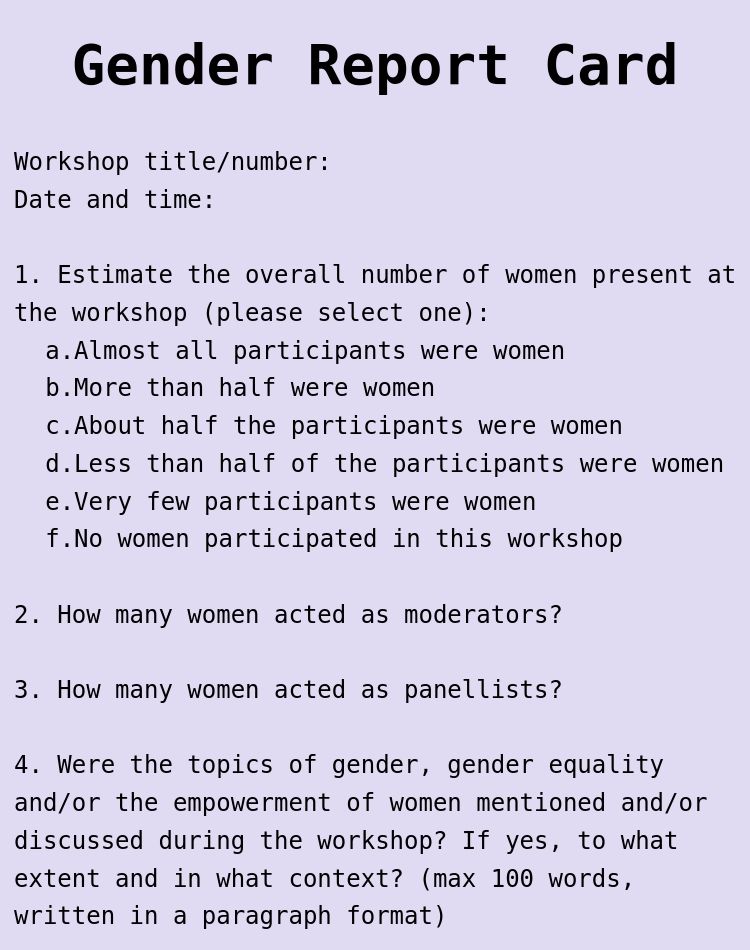Role of gender report cards at the internet governance forum
Gender Report Cards (GRCs) are a mechanism introduced in the 2011 IGF by APC as means to determine gender representation among the speakers, moderators, and participants at the Internet Governance Forum. The report cards also help track the inclusion of gender in various dialogues here. The GRCs have four questions on them:
With the process being formalised and included at the global IGF, all workshop session organisers now have to fill this in when reporting back on their respective sessions. With years of data from the gender report cards, one can track the role and inclusion of gender at the internet governance spaces. They recognise Article 12 of the WSIS Declaration of Principles which states that:
“We affirm that development of ICTs provides enormous opportunities for women, who should be an integral part of, and key actors, in the Information Society. We are committed to ensuring that the Information Society enables women’s empowerment and their full participation on the basis on equality in all spheres of society and in all decision-making processes. To this end, we should mainstream a gender equality perspective and use ICTs as a tool to that end.”
Why do we need the gender report cards
-
Without specific numbers and data on gender at the policy spaces, it would very difficult to advocate for explicit inclusion of women and other marginalised genders at the table.
-
Knowing which discussions and dialogues have a gender perspectives and where this is absent will help us plan on interventions to actively bring in the gender lens in spaces which are absent.
-
This will also help push for bringing speakers who are women and persons of marginalised genders and a gender angle to dialogues and sessions where this is absent, for example in sessions which are heavily technical, sessions on human rights where gender may get left by the side etc.
-
More often than not, gender enters the internet governance discourse through online violence. The fourth question in the gender report cards helps in understanding if gender enters the content of the various sessions and dialogue, and also which aspects of gender, internet, and internet governance are given spaces. And what is left behind.
-
Is simply using the names of the speakers listed in the online schedule sufficient? A research comparing the information online and that in the report cards says no. This is due to the following reasons:
-
Those who actually speak at the sessions are often different from the speakers listed on the schedule. This could be due to last minute cancellations due to visa, travel issues, or clash of sessions for the speakers etc., but this means that the Gender Report Cards would provide the most recent and accurate data on this.
-
There are no gender pronouns in many of the schedule listings. Each speaker may needed to be searched for online to determine their gender. And this too can be problematic in case of a speaker who may not conform to the norms of binary gender presentation and expression.
-
There is no way to determine if gender was discussed at the session unless the gender report card is filled in after the session takes place.
When it is clear that the usage of Gender Report Cards will truly help in measuring the progress of gender diversity and inclusion at the IGF spaces, there are also several challenges to this which are yet to addressed.
-
When workshop session organisers have to fill in the Gender Report Cards as a part of the post session reporting process, several of the organisers skip the questions related to this. In the 2017 Geneva IGF, Gender Report Cards were available only for 40% of the workshops, which is a decline from the 2016 IGF.
The gender reporting section of the report should be mandatory and the same should be stressed for all session organisers.
-
Currently, gender reporting is not done for all the DC sessions, and the main sessions. With these being a very important part of the IGF and essential spaces of discussion on larger emerging topics, the lack of data on gender in these sessions is concerning.
Gender reporting should be mandatory for all sessions and not just the workshop sessions. This includes the question pertaining to the inclusion of gender in the session topic and discussions.
-
The Gender Report Cards currently focus on gender diversity in terms of bringing in more women to the table. With gender being much more than the binary of man and woman, it is time that we started bringing in the gender spectrum to the internet governance spaces. A concentrated effort should be made to include other genders into the IGF spaces and the sessions.
One way of doing this in an inclusive and non-presumptuous manner would be to give a form to the moderator of the sessions at the beginning of the session which will allow them and the speakers to fill in their names with self-identified gender. The form should make it clear that speakers and moderator can fill in their self-identified gender and need not restrict themselves to the binary of woman and man.
We also need to push for the IGF registration portals and forms on the need to expand the gender options available in order to accommodate people of diverse gender identities. This will help in accurately determining the gender diversity in the space. An option of “Prefer not to disclose” is also essential.
-
Currently, the Gender Report Cards are only mandatory at the global IGF. There is no formalised way of tracking gender diversity at the local, national or regional IGFs.
Gender Report Cards must be mandatory for all IGFs and not just the global IGF. Gender inclusion at the global IGF is only so meaningful if this is not reflected in the local, national or regional IGFs.


No Comments